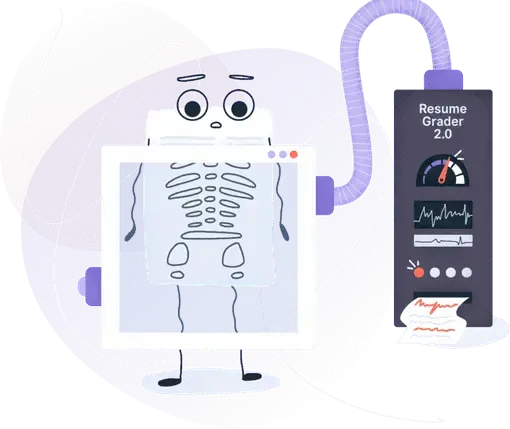Iot Skills: Example Usage on Resumes, Skill Set & Top Keywords in 2025
Listing IoT expertise on your resume signals to recruiters your ability to tackle complex technological challenges and highlights your innovative problem-solving skills. Dive into the guide below to discover fresh ways of showcasing your abilities on your CV and be inspired with new expressions and applications.


Is your resume ATS-friendly?
Drop your resume here or upload a file to find out if the skills in your resume are readable by an ATS.
The term "IoT" refers to the "Internet of Things," which is a skill involving the creation and management of devices that connect and exchange data with the internet and each other. Having IoT skills on your resume indicates to potential employers that you're familiar with networking, sensors, and data analytics, showing you can help create smart devices that communicate with each other. This could apply to anything from home appliances to complex industrial tools, which all aim to streamline operations and gather useful data.
However, listing IoT on your resume might not always be beneficial. One drawback could be that employers may assume you're overly specialized, especially if the job doesn't directly involve IoT projects. If IoT isn't central to the position, instead of prominently featuring it, you could focus on highlighting more universal skills like problem-solving or teamwork, which apply to a broader range of roles. Also, it's more effective to show how your IoT experience contributes to valuable outcomes like increased efficiency or improved user experiences.
In this article, you will learn:
- The potential drawbacks of prominently featuring IoT skills on your resume.
- Alternative skills to highlight for broader appeal to employers.
- Good and bad examples of how to list IoT skills in your resume, including synonyms and different phrasings.
Misusage of iot on resumes
Crafting an effective resume is a critical step in your job search, and representing your IoT skills accurately is key. However, clumsy or exaggerated applications of your IoT abilities can quickly turn off potential employers. You want to showcase a credible understanding and application of IoT, not to mislead with overrated proficiency which can backfire during interviews or on the job.
In the summary section, avoid overgeneralizing your expertise by claiming to be an "IoT expert capable of revolutionizing any tech platform," instead, be specific about your skills. In the experience section, listing "Master of all IoT protocols and devices" is misleading unless you truly have comprehensive mastery, which is rare and often not credible. In the achievements section, do not write something like, "Spearheaded an IoT project that exceeded all company objectives,” unless you can quantify these achievements with clear metrics or outcomes.
How to demonstrate iot skills on your resume
- Highlight your knowledge of IoT protocols such as MQTT, CoAP, and LWM2M by detailing project experiences where you utilized these protocols for effective device communication.
- Showcase your ability to manage and analyze data from sensors and IoT devices by mentioning your proficiency in IoT platforms like AWS IoT, Microsoft Azure IoT Suite, or the IBM Watson IoT Platform.
- Discuss your programming skills, especially in languages relevant to IoT such as Python, JavaScript, or C++, and provide examples of how you've developed applications for IoT systems.
- Illustrate your experience with edge computing and IoT security, making sure to describe how you've implemented secure practices to protect IoT devices from threats.
- Describe any IoT devices or systems that you have built or contributed to, focusing on how you solved practical problems through IoT technology and the impact of your work.
Example 1: Demonstrate iot in the experience section
- •Developed an end-to-end IoT solution for smart factory optimization that improved overall efficiency by 15%.
- •Led a team of 10 in the integration of IoT sensors into warehouse logistics, reducing processing time by 25%.
- •Spearheaded the deployment of an IoT monitoring system for real-time asset tracking, resulting in a 20% reduction in misplaced inventory.
- •Managed cross-functional teams to deliver IoT solutions for energy management, leading to a 10% cost savings in utility expenses.
- •Orchestrated the upgrade of network infrastructure to support IoT connectivity, improving system reliability by 30%.
- •Oversaw the design and implementation of a smart building system for a commercial client, enhancing security and comfort for occupants.
- •Collaborated on the development of IoT-enabled HVAC systems that increased energy efficiency by over 20%.
- •Contributed to the successful application of predictive maintenance models in manufacturing, reducing downtime by 40%.
- •Implemented firmware updates for smart home devices, significantly increasing customer satisfaction due to enhanced performance.
- Each work experience item is packed with clear outcomes and relevant project examples.
- The bullet points reflect significant improvements and concrete results delivered in past roles.
- Location and dates are included to establish context and duration of each role, but the focus stays on achievements.
- Varied action verbs begin each bullet point, showing a proactive role in achieving results.
- Specific metrics are used to illustrate the tangible impact of the work done.
- By avoiding overused jargon, the experience stands out clearly to anyone reading it.
- The description avoids repetition and uses a diverse vocabulary to maintain the reader's interest.
Example 2: Demonstrate iot in the summary section
- Highlights a specific achievement, showing the impact of the applicant’s work on a large scale.
- Demonstrates the ability to apply technical knowledge practically, implying a depth of understanding in the IoT field.
- Clearly states the amount of experience, establishing a timeline of expertise in the industry.
- Communicates passion for technology's role in environmental issues, showing alignment with projects that benefit society.
- Focuses on relevant technical skills without resorting to overused jargon, making the summary more relatable and credible.
Example 3: Demonstrate iot in the achievements section
- The achievements clearly quantize improvements and results, making the impact concrete.
- Titles are brief and focus on the core of the achievement, avoiding unnecessary complexity.
- Descriptions are detailed but concise, illustrating the specific role of IoT in each accomplishment.
- The use of numerical evidence in descriptions supports the effectiveness of the achievements.
- Each entry showcases a different application of IoT, presenting a well-rounded skill set.
- The section avoids industry jargon and buzzwords, making it accessible to non-experts.
What are the relevant certifications for iot skills on resume
Here are certifications that can validate your expertise and assist in advancing your IoT career:
The top 5 certifications for gaining iot skills expertise:
Top skills people add together with iot skill on resume:
Cloud Computing
Machine Learning
Data Analytics
Cybersecurity
Networking
Embedded Systems
Firmware Development
Wireless Technologies
Sensor Technologies
Big Data
Problem-Solving
Critical Thinking
Adaptability
Teamwork
Communication
Creative Thinking
Project Management
Time Management
Leadership
Attention to Detail
Research
Most relevant jobs for iot skills
With the rapid growth of interconnected devices, IoT skills are in high demand across various industries. These skills are critical in roles that involve the development, implementation, and management of smart devices and systems. Professionals with IoT expertise can expect to find opportunities in sectors ranging from manufacturing to healthcare, where they can apply their knowledge to improve efficiency, data analysis, and connectivity.
- IoT Solutions Architect - Designs comprehensive IoT solutions to meet business needs.
- Embedded Systems Engineer - Creates software for embedded devices within IoT frameworks.
- Data Scientist - Analyzes complex data from IoT devices to provide actionable insights.
- IoT Security Specialist - Safeguards IoT networks and devices from cyber threats.
- IoT Developer - Constructs IoT applications and services for various platforms.
- Product Manager (IoT) - Oversees the lifecycle of IoT products from conception to launch.
- IoT Systems Administrator - Manages and maintains the infrastructure for IoT operations.
- Industrial IoT Engineer - Implements IoT solutions in industrial settings to optimize processes.
- IoT Network Engineer - Ensures the reliability and efficiency of networks connecting IoT devices.
- Customer Support Engineer (IoT) - Provides assistance for customers using IoT products and services.
Key takeaways
- Understanding IoT skills can make your resume stand out and show your capability to work with interconnected devices.
- Avoid misusing IoT proficiency by staying updated on security practices and using these skills responsibly.
- Showcase your IoT expertise on your resume by including specific projects, certifications, and relevant experience.
Make one that's truly you.




